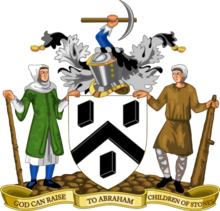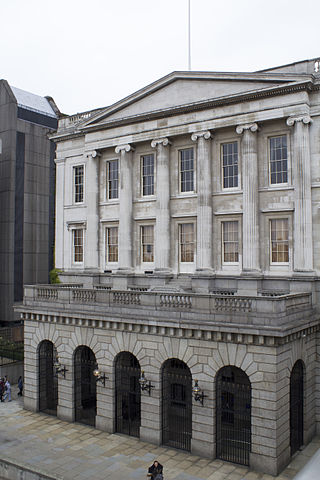
A livery company is a type of guild or professional association that originated in medieval times in London, England. Livery companies comprise London's ancient and modern trade associations and guilds, almost all of which are styled the "Worshipful Company of" their respective craft, trade or profession. There are 111 livery companies in total. They play a significant part in the life of the City, not least by providing charitable-giving and networking opportunities. Liverymen retain voting rights for the senior civic offices, such as the Lord Mayor, Sheriffs and Common Council of the City Corporation, London's ancient municipal authority with extensive local government powers.

The Worshipful Company of Fishmongers is one of the 111 Livery Companies of the City of London, being an incorporated guild of sellers of fish and seafood in the City. The Company ranks fourth in the order of precedence of City Livery Companies, thereby making it one of the Great Twelve City Livery Companies.

The Worshipful Company of Glovers is one of the Livery Companies of the City of London. Glovers separated from the Cordwainers to form their own organisation in 1349 and received a Royal Charter of incorporation in 1639. The company is, as are most other Livery Companies, a charitable body, but it still retains close links to its original trade.

The Worshipful Company of Masons is one of the ancient Livery Companies of the City of London, number 30 in the order of precedence of the 110 companies. It was granted Arms in 1472, during the reign of King Edward IV; its motto is “God Is Our Guide”.
The Worshipful Company of Gardeners is one of the livery companies of the City of London. An fraternity of Gardeners existed in the middle of the fourteenth century; it received a royal charter in 1605. The company no longer exists as a regulatory authority for the sale of produce in London; instead serving as a charitable institution. The company also performs a ceremonial role; it formally presents bouquets to the Queen and to princesses upon their wedding, anniversary, or other similar occasion.
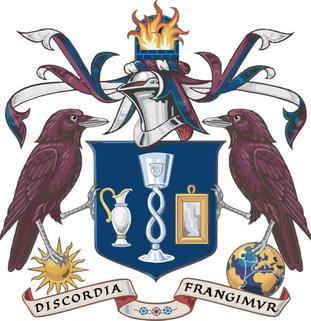
The Worshipful Company of Glass Sellers is one of the livery companies of the City of London. The company received its royal charter from King Charles II in 1664. Its role was to regulate the glass selling and pot-making industries within the City of London, and to ensure quality and fair trade. Aspiring traders in glass were apprenticed to a master who was a member of the Glass Sellers Company. He in turn was accountable to the court and officers of the livery and ultimately to the master of the company.
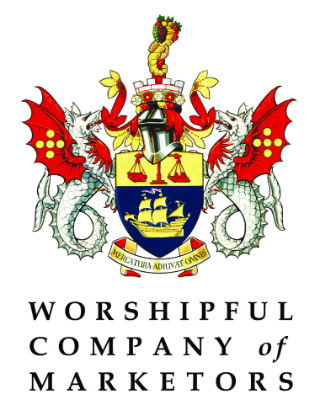
The Worshipful Company of Marketors is one of the 111 livery companies of the City of London. The company was founded in 1975.
The Worshipful Company of Arbitrators is 93rd in the order of precedence of the livery companies of the City of London. The organisation formally became a livery company on 17 March 1981. The company supports education in the field of arbitration. It also functions as a charitable institution. Its motto is Law and Custom, and its church is St Mary-le-BowSt Mary-le-Bow.
The Worshipful Company of Hackney Carriage Drivers is one of the 111 livery companies of the City of London. Its members are professional hackney carriage drivers, including London black taxicab drivers who have learnt the knowledge of London.
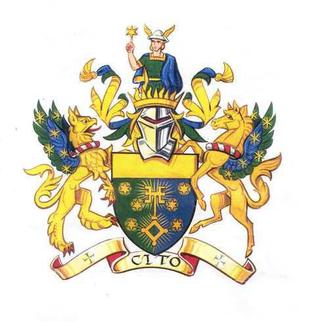
The Worshipful Company of Information Technologists, also known as the Information Technologists' Company, is one of the livery companies of the City of London. The company was granted livery status by the Court of Aldermen on 7 January 1992, becoming the 100th livery company. It received its Royal Charter on 17 June 2010 from Prince Edward.
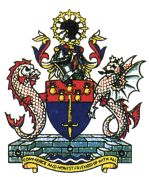
The Worshipful Company of World Traders is one of the 111 Livery Companies of the City of London.

The Worshipful Company of Water Conservators is one of the Livery Companies of the City of London.
The Worshipful Company of Constructors is one of the Livery Companies of the City of London. The Company aims to bring together those professionally qualified individuals concerned with aspects of building design, execution, management, vision and economic appraisal.

The Worshipful Company of Firefighters is one of the 111 livery companies of the City of London. The Company's aim is to promote the development and advancement of the science, art and the practice of firefighting, fire prevention and life safety. It operates essentially as a charitable organisation, and also encourages professionalism and the exchange of information between members and others who work in allied fields.
The Worshipful Company of International Bankers is one of the livery companies of the City of London. Its members are current or former members of the financial services industry, primarily banking. It is based in a building in Austin Friars, near Liverpool Street station.
The Worshipful Company of Tax Advisers is a livery company of the City of London. It draws its membership from tax advisers and other taxation-related practitioners.

The Worshipful Company of Security Professionals (WCoSP) is the 108th Livery Company of the City of London. It is a non-profit making organisation providing education and health services to members of the security profession.

The Worshipful Company of Educators is the 109th livery company of the City of London, having been granted livery status on 10 September 2013 by the Court of Aldermen. The Company was founded on 24 May 2001 as a Guild to represent the education and training profession and for charitable purposes. On 15 September 2009 the City's Court of Aldermen granted the petition of the Guild of Educators and agreed that the Guild be constituted one of the Companies of the City, without a grant of livery, with the title of The Company of Educators and that its Ordinances be approved and duly enrolled amongst the records of the City. Upon being advanced to the status of City livery company in 2013, the Company was accorded the official title of Worshipful Company of Educators, although less formally it can continue to be known as the Educators' Company.

Sir David Hugh Wootton is an English lawyer and politician. He was the 684th Lord Mayor of London, from 2011 to 2012, and is the Alderman of the Ward of Langbourn.
The Company of Entrepreneurs is a Company without Livery and an aspirant Livery Company of the City of London. It successfully petitioned the Court of Aldermen for Guild status in 2014 with ambitions to become a full Livery Company by 2024. It is a membership and charitable organisation formed of men and women connected with the City of London who have invested their own time and financial resources in establishing and running successful businesses and enterprises. Its motto is Dare, Create, Succeed
